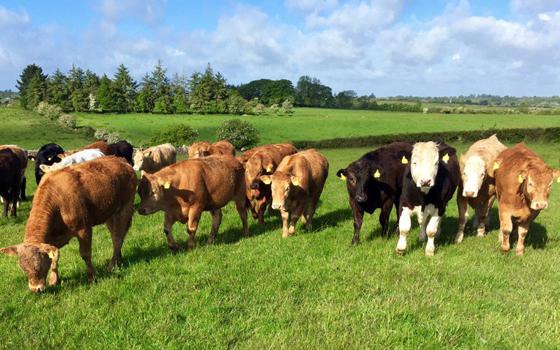Irish exporters expressed their willingness to secure a contract to supply cattle to the Egyptian market, according to AgriLand’s website.
This keenness came after lifting Egypt’s ban on the import of Irish meat, which lasted for 20 years because of mad cow disease.
The website said that the Egyptian market has an annual demand of 150,000 cattle, predominately serviced by imports from South America.
“Earlier this week, the Department of Agriculture agreed health certificates with Egyptian authorities to allow fattening livestock to be exported to the North African market,” said the website. “Irish exporters will be made aware of the country’s cattle requirements in the coming days, and a number of high-profile shippers are thought to be keen on exporting Irish cattle to Egypt”.
Under the agreed terms, Irish cattle are required to spend 21 days in quarantine prior to being shipped to Egypt.
In addition, the livestock destined to be exported must be under 12 months of age and less than 225 kg in weight at the beginning of this quarantine period.
Furthermore, exports to Egypt hinge on Ireland’s bluetongue-free status, and all animals are required to have been kept in a bluetongue-free country since birth, according to the website.
This could give Irish cattle an advantage over those sourced from other countries, such as France. Like Ireland, French authorities agreed on health certificates with Egyptian officials in recent weeks.
However, a number of cases of bluetongue have been recorded in France this year, and this could potentially limit the country’s ability to ship cattle to Egypt.
Regarding prices, the website said that Egyptian buyers will be particularly interested in securing Friesian-type cattle for further feeding. But the market price of these animals will most likely dictate the quantity, if any, exported from Ireland in the near future.
In 2016, an agreement was reached between Irish and Egyptian authorities to ship finished livestock to the North African market.
In 2016, the Egyptian buyers were willing to pay €2.60/kg for finished Irish cattle; approximately 50-60c/kg of this was set aside to cover assembly, transportation, and quarantine costs.
However, Irish cattle prices were too expensive and buyers for the Egyptian market were unable to secure the supplies they desired to make exports viable.
The Irish Farmers’ Association’s (IFA’s) National Livestock chairperson, Angus Woods, has called upon the Minister of Agriculture, Food, and the Marine, Michael Creed, to include a visit to Egypt—focusing on live cattle exports—in his autumn schedule.
In March, a meeting between the president of the IFA, Joe Healy, and Egyptian Ambassador Soha Gendi to discuss the outlined details of a government project seeking 1 million head of livestock to be exported to Egypt.
The ambassador also explained that Ireland had been prioritized as one of the top countries, which Egypt hopes to cooperate with in relation to the project.
Daily News Egypt
























































